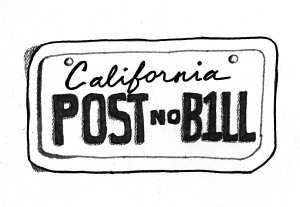Ludicrous license plate changes would be tiring
If legislators get their wish, the latest attempt to make a dent in California’s staggering $19.1-billion deficit might be coming to a traffic jam near you in the Golden State, and it might be in the form of a foot-long flashing McDonald’s sign.
Californian lawmakers are launching a study to test the feasibility of converting license plates into digital advertisements, essentially small-scale versions of the many electronic billboards scattered around Los Angeles.
Proponents of the digital switch tout the millions of dollars in advertising revenue the new plates would bring in, along with other possible benefits that could be tacked on later, including easier automobile registration features and a system that would immediately alert drivers of hazardous conditions.
If this seems a little like reinventing the steering wheel, perhaps it’s because it is. The general infeasibility of the plan and the detriments far outweigh the much-lauded accoutrements.
Gov. Arnold Schwarzenegger has already promised to veto any legislation that comes to his desk regarding the ambitious digital doohickeys.
“The legislature needs to focus on passing a budget that lives within our means instead of distracting drivers to raise revenues,” his office said in a statement it released Tuesday.
The governator’s office astutely points out one of the many flaws of the plan — its potential to distract drivers. Many L.A. motorists are negligent enough, be it from illegally talking on their cellphones (ahem, Maria Shriver) or squinting their eyes to read the novelty bumpersticker on the car in front of them. (My Kid Beat Up Your Honor Student.)
Add in a talking Geico, and road rage might replace distraction as the bigger roadblock.
While the advertisements are playing, (only after the car has been stopped for four seconds, according to the plan’s lobbyists), the license numbers will be relegated to miniscule type on the corner of the plate.
The plan raises more incredulity than it assuages. For the ads to play perfectly on cars across the state, California would have to implement a state-wide wireless system — a requirement that leaves the proposal open to technical glitches.
Indignant bloggers have proposed that California’s wi-fi could be the victim of rolling blackouts, wiping the license numbers from every car on the road, or worse, that the system could be hacked by adventurous Internet pirates intent on broadcast obscene images.
Wild schemes about traveling pornography aside, the proposed change’s biggest problem is not its vulnerability to snafu or trickery — it’s the fact that legislators want to foist off California’s budget woes on constituents who might not want to be speeding Don Draper pawns. This is a ludicrous fix for a problem that demands and deserves hard thought.
California’s deficit won’t be solved by applying a goofy Band-Aid to a bullet wound, and the sooner lawmakers realize that, the sooner they can go to work solving the problem with realistic approaches.
So hats off to Schwarzenegger for recognizing a lame duck when he sees one.
And to you, lawmakers, I say this: Californians don’t want to be just another cog in the wheel.
Lucy Mueller is a senior majoring in cinema-television production.

